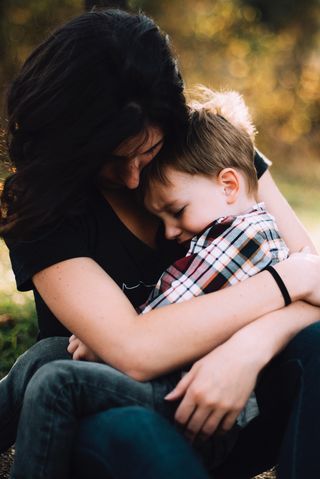Anxiety
When Anxious Adults Raise Anxious Children
How well-intentioned grown-ups reinforce kids' fears, worries, and stress.
Posted August 14, 2019 Reviewed by Matt Huston

Homework angst. Sleepless nights. Stomachaches. Panic attacks.
Parents of anxious kids dread the start of the academic year. Most classrooms haven't even opened their doors, yet administrators and counselors are already bombarded with parental stress.
Not your mama’s new school year.
While managing unpredictability remains a core component of overcoming worries and fears, one thing remains constant: Anxious adults raise anxious children.
Parents naturally want the best for their children. And nobody’s denying the juggling act of balancing child-rearing with work, tutoring, extracurriculars, and other obligations. It’s easy to see how weary adults choose the well-intentioned route of softening their child’s anxiety in the form of accommodations.
Family accommodation, which was first studied in relation to OCD (Calvocoressi et al., 1995; Lebowitz, Panza, Su, & Bloch, 2012; Storch et al., 2007) and more recently across anxiety disorders (Lebowitz et al., 2013), describes parental behaviors aimed at helping a child avoid the distressing emotions caused by the disorder. Accommodation can include both active participation in the child’s anxiety symptoms and modification of the parents’ or family’s routines in an effort to ease the symptoms of anxiety. For example:
- Emailing Sara’s school counselor, because she didn’t make the coveted dance team.
- Advocating that John be excused from physical education on running days because classmates make fun of his slow time.
- Allowing Lisa to skip school to complete her essay, because she’s stressed out.
- Replying to Rudy’s constant text messages during school hours.
While in the short term this may seem innocuous, the reality is that parents are prolonging the inevitable meltdowns because their kids can’t problem-solve.
The good news is that parents can learn to do differently in the face of anxiety.
The Yale Child Study Center called SPACE (Supportive Parenting for Anxious Childhood Emotions) has developed a program where grown-ups are taught to help their children manage anxiety by reducing the accommodations they make for their children’s symptoms.
SPACE is designed to be implemented with school-age children and teens and is exclusively parent-based, a treatment modality existing without child collaboration. The program focuses on changing parent responses to the child’s anxious states, gradually withdrawing the accommodating behaviors on which the child has come to rely. This systemic approach differs from the conventional method of focusing on the individual child’s relationship with anxiety.
While SPACE is not a new or novel concept, it highlights what many psychotherapists who treat families have known for years: Children do not exist in a vacuum, and how parents and caretakers respond to stress will inform their own behavioral reactions to setbacks.
Nearly one-third of youth have had an anxiety disorder, and more than 8 percent experience severe impairment, according to the National Institute of Mental Health. When left untreated, anxiety is one of the strongest indicators of mental health issues down the line.
As another academic year looms, perhaps schools can adopt programs and frameworks aimed at reframing parental and familial fears and worries. Because when Sara figures out that more ballet (and less Netflix) will improve her dance technique, and when Rudy sees that the majority of his classmates do not ask for a bathroom pass in order to FaceTime Mom and Dad, they will employ the critical thinking and successful problem-solving skills required to avoid anxiety in adulthood.
Click here for a popular article about reducing anxiety in parents and children.
Copyright 2019 Linda Esposito, LCSW


